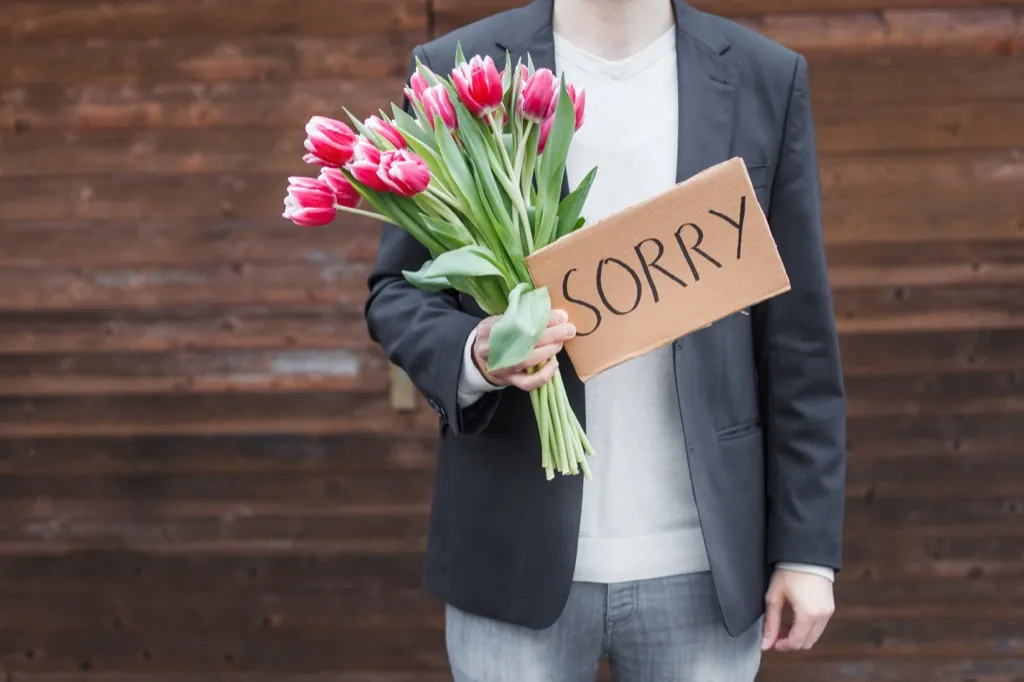What s Something You Continue to Lie About
Honesty is the secret spice in the recipe for happiness, health, and overall wellbeing—but sometimes, we're told to tell little white lies for the sake of other's happiness, health, and overall wellbeing. It can be confusing, right? To help you navigate how to handle the truth responsibly, we've consulted therapists, scientists, researchers, and other experts to find out what things you should never lie about. Here's when it's worth rising to the challenge of being completely honest.

Pet peeves seem like small, petty annoyances, so it's natural that many people keep theirs to themselves. However, that annoyance builds up over time—and, especially in your close relationships, pet peeves can turn into ticking time bombs for an emotional explosion that's far larger than it needs to be. Sure, it's not easy telling your spouse that they chew loudly. But it's much, much easier to come back from a mildly uncomfortable conversation than from an incendiary outburst over the breakfast table.
"Being openly honest with your feelings in any relationship—whether it's family, friends, or coworkers—can help prevent conflicts and miscommunication," says neuropsychologist Sanam Hafeez of Comprehensive Consultation Psychological Services in New York City. "Again, a little discomfort in addressing an issue early on can lead to a more understanding experience in any interpersonal relationship."

It seems so simple, but many of us lie about or conceal our go-to entertainment choices for the same reason we avoid sharing our pet peeves: They can feel embarrassing and unimportant. So people posture about books they've only skimmed, hide the guilty pleasure shows they throw on after a busy day at work, and hold back their dietary preferences out of the fear that a vegan might start a debate. All of this keeps us from connecting with others who might also love the things we love in life, whether it's dairy or reality television.
"People are more scared than ever to be honest about who they are," says family counselor Robin Flint. "It's no longer as simple as which sports team you support, your favorite clothing store, what hobby you do when relaxing, and what your favorite movie is." So, tell your friends you love The Bachelor. Order extra cheese on your pizza. Admit that you couldn't get through The Power Broker. It'll be OK.

Sometimes, the basic "thanks, but I'm good" social cues—an obvious disinterest in conversation, clear body language that signals nope—don't cut it. In those cases, honesty about your discomfort takes precedence over being nice. Yes, setting that boundary can be stressful, but it's no more anxiety-inducing than allowing those boundaries to be pushed.
"If you feel threatened in any way, be honest about it," says Flint. "If you are uncomfortable for some reason, share it."
Hafeez agrees, warning that, "If you do not openly share that you are uncomfortable, keeping this in can lead to anxiety while failing to address and stop a situation from continuing to overwhelm you."

People lie about being sick in order to go to work so often that social scientists have coined a term for it: "presenteeism." As many as 70 percent of Americans are guilty of this, and most of them understandably blame job security; if they don't show up, what does that say about their "commitment" to the company? But this thinking keeps people ill longer, causes others to get sick, and, all told, costs the United States about $226 billion in lost productivity every year. We can all be a bit more honest about that fever.

When employers are dishonest about job descriptions, it's a waste of time for everyone. These job interviews are like bad Tinder dates, except way worse for the economy. However, thanks to the rise of startups, the gig economy, and hustle culture, one of the more ubiquitous job requirements has become the ability to "go with the flow" and infinitely roll with changing expectations. Whether or not that's good for a company's bottom line remains to be seen, but it's not great for employees trying to maintain any work-life balance.
"Employers should be upfront about expectations in terms of work hours, production standards, dress codes, and other employee conduct standards," says Bryan Zawikowski, an executive recruiter for 25 years. "There is no room for ambiguity here."
"There are so many examples of bait-and-switch hires that then lead to that new hire either not meeting expectations or moving on to another organization quickly—all of which could be avoided by being upfront and honest in the beginning," adds Brittany Canty, a consultant and diversity advocate in Chicago.

Though most people prefer to complain to their colleagues about elements of their job that are counterproductive or creating more work, it's crucial to be honest with your boss when you notice something that can be improved upon.
Since it can be difficult for associate-level staffers to just offer this up—they might worry about looking insubordinate to their superiors—managers should ask for this feedback directly and anonymously, suggests Matthew Ross, co-owner and COO of the mattress review site The Slumber Yard.

Being honest when you have no clue is always better than faking it. As Tenelle Porter, a postdoctoral researcher at the University of California, Davis, writes, there are a plethora of cognitive benefits to admitting when you don't know something. Scientists suspect this is a result of something known as a growth mindset, or the idea that intelligence is something in flux and earned overtime, rather than something that is permanent or genetic. And in many ways, an ability to admit not knowing helps people avoid lying further.
"Don't be afraid to say, 'I don't know,'" says psychotherapistFran Walfish, author of The Self-Aware Parent: Resolving Conflict and Building a Better Bond with Your Child. "You can always come back and answer later but you can't erase a lie told."

As technology has increased the opportunities to cheat, it's also increased the opportunities to get caught—through emails, credit card receipts, Ashley Madison hacks, and other paper trails. Journalists, celebrities, politicians, and other high-profile people have all learned this lesson the hard way. From Brian Williams' infamous lies about his experience in Iraq to Steve Rannazzisi's notorious lie about escaping the Twin Towers, false claims often take on a mythology of their own and compromise people's careers and integrity. Eventually, they become damning and impossible to maintain.
"The problem is that, when a person starts lying and keeps getting away with it, the lying can become a habit," says Walfish. "It's key to deal with the lying behavior immediately."

Being honest about someone hurting you emotionally can help bring you closer, whereas the flip side—burying pain or attempting to let it go entirely—only creates distance. There's nothing wrong with having hurt feelings, but keeping that from the person who caused them robs them of the opportunity to make it right. No one ever feels better as a result.
"Being honest about your feelings allows you to let go of any resentment, bitterness, or tension you feel towards the other person," says Rebecca Ogle, a licensed clinical social worker and therapist in Chicago. "It gives the other person a chance to make amends and explain their perspective, and gives both of you insight into how to communicate more effectively moving forward."

Being honest when you're wrong is as important as it is difficult—because it's not easy to recognize. When people are wrong, their brains tend to adapt in self-protective ways, forming what the scientific community calls "cognitive biases."
"We can delude ourselves with all sorts of defenses and, when we do, we train our brains and minds to distort perception to suit our needs," explains neuropsychologist Howard Rankin, who's based in Hilton Head, South Carolina. This behavior can cause people to become more chronically dishonest in the long term, so it's important to develop an awareness of these impulses and resist them whenever possible. "Telling lies isn't just about misleading ourselves and others; it is also about training our brains to be manipulative and deceptive."

It's important to be completely honest when you realize you've screwed up. It's important to apologize, too—but many people try to get around explicitly admitting guilt when they say "sorry." While it's a natural and expected result of discomfort, it causes apologies to come across as insincere.
"Feelings of guilt or shame can cause you to use diminutive terms when apologizing," notes psychotherapist Steven Reigns of Los Angeles. "To the receiver, it can sound as if you're expecting them to take a percentage of the blame—or that your apology has loopholes and conditions."

According to a 2019 survey from CreditCards.com, up to 20 percent of Americans hide bank accounts from their significant others. And in 2018, the National Endowment for Financial Education found that 41 percent of adults in the U.S. are financially dishonest in one way or another.
But talking about money (or the lack thereof) in relationships is a lot like talking about sex: Avoiding honest, uncomfortable conversations in the short term causes more problems in the long run. "Topics around money problems, ways in which we feel disappointed with ourselves, or might have hurt other people, are especially tender areas," says psychotherapist Dana Dovitch, who's based in Sherman Oaks, California. "It takes courage to embrace our difficulties with personal compassion."

In order to live happy and healthy lives, people need to be honest with their friends, significant others, and families about bad habits that serve as signs that they're not doing well.
"These negative patterns can show up with supervisors at work, neighbors, salespeople, and romantic relationships," Reigns says. "A good friend can address it with an inquiring question, 'This is now the third boss you've had trouble with. What might be going on?'"

Negative behaviors patterns can spiral very quickly into anger, anxiety, substance abuse, depression, and other problems, and one of the healthiest ways to cope is by being honest about not being OK. Unfortunately, it's a very difficult thing to admit—but it's also incredibly important.
"This transparency may be difficult because of the stigma surrounding mental health issues," says Heidi McBain, a marriage and family therapist in Flower Mound, Texas. Much like with sexual health, minimizing the stigma around mental health is essential for improving our collective psyches.

Fact: The older you get, the more responsibilities you have. Between work, family, friends, and romance, honesty about how many free hours you have in the day is crucial for maintaining your relationships—particularly with friends. The strongest friendships are the ones where everyone's transparent about the fact that, hey, beers at 5 p.m. on Tuesday might not be the most practical use of time.
"Friendships grow and change over our lives, and what you want and need from them, but also what kind of resources you're able to give to them changes as well," says psychologist and psychoanalyst Mark Borg, the author of Don't Be a ****: Change Yourself, Change Your World. "You can improve your friendships if you're as honest as you can be about the limitations you have."

You should always be honest about asserting your personal boundaries—and respecting those of others. In the wild, the most basic example of this is the waiter-diner relationship, since both roles are clearly defined. Courtesy of the social contract, there's a process and a protocol in place for dealing with, say, a mistaken food order without being a total jerk about it.
"This challenges us with the boundary of being a customer and entitles us to certain ways of behaving that other relationships do not," says Borg. "This means giving your opinion about food, service, and other customer service in ways that can be heard and addressed."
There's no need to eat an entire well-done burger just because you don't want to risk confrontation with your waiter. Still, it's imperative to be polite, and to only address the food—never personally insult them.

Particularly in the workspace, life drums up plenty of situations in which you're expected to play nice and make friends. You might find yourself at an office happy hour, facing personal questions like, "Do you have any kids?" or "What do you like to do on the weekends?" But you're well within your rights to demur. When you want to keep things purely professional, it's OK—essential, even—to voice that.
"This honesty prevents you from venturing further into a relationship that you're not comfortable with, ready for, or simply don't want," Borg says. "And it allows you to honor your own feelings in ways that are not overly crushing to others."

Withholding personal information may be an important way to be honest with people you want to keep at arm's length, but the opposite is true for those you'd actually like to be friends with. As public speaker and social worker Brené Brown explained in a viral TED Talk—and later expanded on in the Netflix special The Call to Courage—vulnerability is one part of human connection that folks regularly struggle with. Still, if you want to foster a real connection, you have to let yourself be honest, transparent, and yes, even a little bit vulnerable.
"I see so many people avoiding real connection, either through the veil of social media or because we're afraid to be vulnerable with one another," says marriage and family therapist Lauren Cook, who's based in San Diego, California. "If we truly want to find connection and meaning with each other, we have to be honest about how we make each other feel."

Being honest about your intimate needs and desires in a relationship leads to deeper, more meaningful romantic relationships—not to mention the fact that it keeps big problems from festering. "Sexual honesty leads to sexual satisfaction," says Tina Tessina, a psychotherapist and author ofIt Ends With You: Grow Up and Out of Dysfunction. "Couples who can talk about their sexual needs and wants become more effective at pleasing and enjoying each other."
However, if you've been holding back in this department, coming clean can be overwhelming. In these cases, couples can benefit from the aid of a therapist, who can help them reveal the truth. "The shock of learning too much truth at once can be detrimental to the relationship if there's no objective party involved," Tessina warns.

While harassment can occur in any environment, it's exceptionally challenging to be honest about it in the workplace due to the power dynamics in play. If, say, an intern or a low-ranking employee is harassed by a member of senior management, they might feel pressure that prevents them from speaking up. What if reporting it to HR results in a pink slip? How will they explain the gap on their résumé to future employers? Will they be pushed out of the industry entirely?
Yes, honesty in such situations is daunting and difficult—but that's all the more reason it's essential. "One of the most important topics to be honest about—and one of the hardest for many employees to speak about—is sexual harassment," says Nina LaRosa, the marketing director for Moxie Media, an organization that offers sexual harassment training for businesses.
Of course, supportive superiors with open door policies help encourage honesty about harassment, but it's not a perfect self-policing system. For people to feel safe sharing these experiences, employers need to be honest about how real of a threat retaliation is—and they need to promise to protect their employees from retribution when they report bad behavior.
"We're never going to fix the #MeToo problem if employers don't get real about prevention and accountability, and make sure that the person reporting doesn't end up in a worse place than the person who engaged in inappropriate behavior," says Paula Brantner, a legal advocate for people in toxic work environments in Silver Spring, Maryland.

Data on cheating is hard to pin down, because it mostly relies on people being honest about their lies with social scientists. That said, if there is one common thread when it comes to infidelity, it's that a majority of people end up coming clean—and experts overwhelmingly agree that's because the guilt is too much. Sure, the truth hurts, but the secret can be even more toxic. And the longer people hold it in, the worse it gets.
"Keeping secrets causes stress and anxiety, which is harmful to health because it raises blood pressure, depresses the immune system, and is implicated in cancer and heart disease," Tessina says. "Because secrets are difficult to keep, the problems that arise when they are found out increase stress."

While there aren't any formal state or federal laws against not disclosing your status to sex partners, if it can be proven that a person knowingly and recklessly passed on an STD, it is punishable in civil court. And in some states, like California, knowingly transmitting STDs or HIV is punishable in criminal court, as well, with actual jail time on the table. Despite the possibility of serious legal ramifications, plenty of people still fail to disclose due to shame. But increasing honesty about STDs and STIs means minimizing the stigma surrounding them, too.
"One of the most important things people should be honest about is their STI status," says Jenelle Marie Pierce, a sexual educator, activist, and the executive director of the The STI Project. "Folks sometimes choose not to disclose before putting partners at risk, and disclosure is required for full consent."

If you're weighing whether or not to be totally honest, you have to ask yourself one question: "Would dishonesty change an important decision another person has the right to make?" Living your best life doesn't mean spilling everything about yourself to everyone. But it does mean sharing information others need to make good choices themselves.
"Any time deception limits [another] person's ability to make important choices, then that deception is most likely doing more harm than good," says Tim Cole, a communications professor at DePaul University who studies deception.
For instance, if you're in a relationship and you have feelings for someone else and keep that from your partner, you're withholding information that may help them make a better decision for themselves. They might want to address the rift directly, leave the relationship entirely, or try any number of other options. What's important is that they have all the intel they need to make their choice.
"Misleading a partner about something more trivial—'Yes, honey, dinner was good tonight'—doesn't rise to the same level of harm," Cole says. "But using deception to take away a partner's ability to make important decisions about their life is generally unethical."
napoleonbuffive94.blogspot.com
Source: https://bestlifeonline.com/things-you-should-never-lie-about/
0 Response to "What s Something You Continue to Lie About"
Postar um comentário